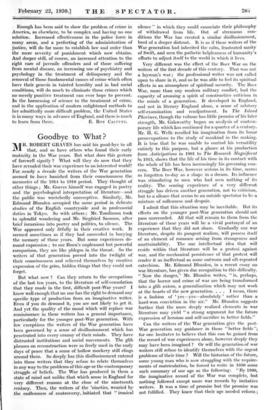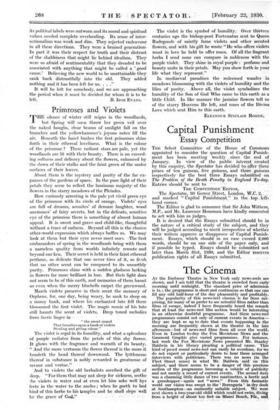Goodbye to What ?
MR. ROBERT GRAVES has said his good-bye to all -that, and so have others who found their early maturity in the War years. But what does this gesture of farewell signify ? What will they do now that they have revealed their war experience to an interested world? For nearly a decade the writers of the War generation seemed to have banished from their consciousness the memories of the 1914 to 1918. period. They thought of other things ; Mr, Graves himself was engaged in poetry and the, psychological interpretation of literature—and the public was wretchedly unreceptive. Similarly, Mr. gadmund Blunden occupied the same period in delicate studies of the English countryside and in professorial duties in Tokyo. So with others ; Mr. Tomlinson took to 'splendid wandering and Mr. Siegfried Sassoon, after brief incursions into poetry and politics, to silence. The War appeared only fitfully in their creative work. It seemed sometimes as if they had succeeded in burying the memory of those years. But some experiences de- mand expression ; to use. Ibsen's unpleasant but powerful comparison, they are like phlegm in the throat. So the writers of that generation peered into the twilight of their consciousness and relieved themselves by creative expression of the grim, hidden things that they could not forget.
But what now ? Can they. return to the occupations of the last ten years, to the literature of self-consolation that they made in the first, difficult post-War years? I 'know well enough that no one has the right to demand any specific type of production from an imaginative writer. Even if you do. demand it, you are not likely to get it. And yet the quality of the mood which will replace war reminiscence in these writers has a general importance, particularly for the younger post-War generation. With few 'exceptions the writers of the War generation have been governed by a sense of disillusionment which has penetrated into every cranny of their minds. They have distrusted institutions and social movements. The glib phrases on reconstruction were so freely used in the early days of peace that a sense of hollow mockery still clings around them. So deeply has this disillusionment entered into these writers that they refuse to relate themselves in any way to the problems of this age or the contemporary struggle of beliefs. The War has produced in them a state of mind not unlike that which arose in England for very different reasons at the close of the nineteenth century. Then, the writers of the 'nineties, wearied by the endlessness of controversy, initiated that " ironical silence " in which they could enunciate their philosophy of withdrawal from life. Out of strenuous con- ditions the War has created a similar disillusionment, bred of a deeper distrust. It is as if these writers of the War generation had inherited the calm, frustrated sanity of Swift, and seen the pathetic helplessness of humanity's efforts to adjust itself to the world in which it lives.
Very different was the effect of the Boer War on the writers of the first decade of this century. That was not a layman's war ; the professional writer was not called upon to share in it, and so he was able to feel its spiritual effects in an atmosphere of spiritual security. The Boer War, more than any modern military conflict, had the capacity of arousing a spirit of constructive criticism in the minds of a generation. It developed in England, and not in literary England alone, a sense of salutary self-examination and readjustment.. In The Island Pharisees, though the volume has little promise of his later strength, Mr. Galsworthy began an analysis of contem- porary life which has continued for a quarter of a century. Mr. H. G. Wells recalled his imagination from its lunar preoccupations to the study of mankind in the making. It is true that he was unable to control his versatility entirely to this purpose, but a glance at his production from Anticipations in 1901 to The Research Magnificent in 1915, shows that the life of his time in its contact with the whole of life has been increasingly his governing con- cern. The Boer War, however serious in its time, seems as forgotten to-day as a shape in a dream. Its influence was stimulating to men who had seen nothing of its reality. The searing experience of a very different struggle has driven another generation, not to criticism, but to a silence that seems to an outside spectator to be a mixture of sullenness and despair.
I admit that this situation may be inevitable. But its effects on the younger post-War generation should not pass unrecorded. All that will remain to them from the literature of these years will be a vivid portrayal of an experience that they did not share. Gradually our was literature, despite its pungent realism, will possess itself of an element of romance arising from strangeness and unattainability. The one intellectual idea that will reside within that literature will be a protest against war, and the mechanical persistence of that protest will render it as ineffectual as some outworn and oft-repeated catechism. Mr. Edmund Blunden, in a recent essay on war literature, has given due recognition to this difficulty. " Now the danger," Mr. Blunden writes, " is, perhaps, that the horror and crime of war are being transformed into a glib axiom, a generalization which may not work at the hearts of the new generation. . . . I mean, there is a fashion of ' yes—yes—absolutely ' rather than a hard-won conviction in the air." Mr. Blunden suggests further that the more deeply realized elements in war literature may yield " a strong argument for the future expression of heroism and self-sacrifice in better fields."
Can the writers of the War generation give the post- • War generation any guidance in those " better fields"; for one hesitates to believe that this can be gained from the record of war experiences alone, however deeply they may have been imagined ? Or will the generation of war writers still refuse to identify themselves with the urgent problems of their time ? Will the historian of the future, some young man who is now struggling with the require- - ments of matriculation, be forced to write in 1950 some such summary of our age as the following: "By 1980, the imaginative record of the War was complete, but nothing followed except more war records by imitative writers. It was a time of promise but the promise was not fulfilled... They knew that their age needed reform ; its political labels were outworn and its moral and spiritual values needed complete overhauling. Its sense of- inter- nationalism was weak and dim. They rejected endeavour in all these directions. They were a bruised generation In part it was their respect for truth and their distrust of the shabbiness that might lie behind idealism They were so afraid of sentimentality that- they dreaded to be associated with anything that might be called a ' good cause.' Believing the new world to be unattainable they sank back distrustfully into the old. They added nothing and it has been left for us. . . ."
It will be left for somebody, and we are approaching the period when it must be decided for whom it is to be











































 Previous page
Previous page